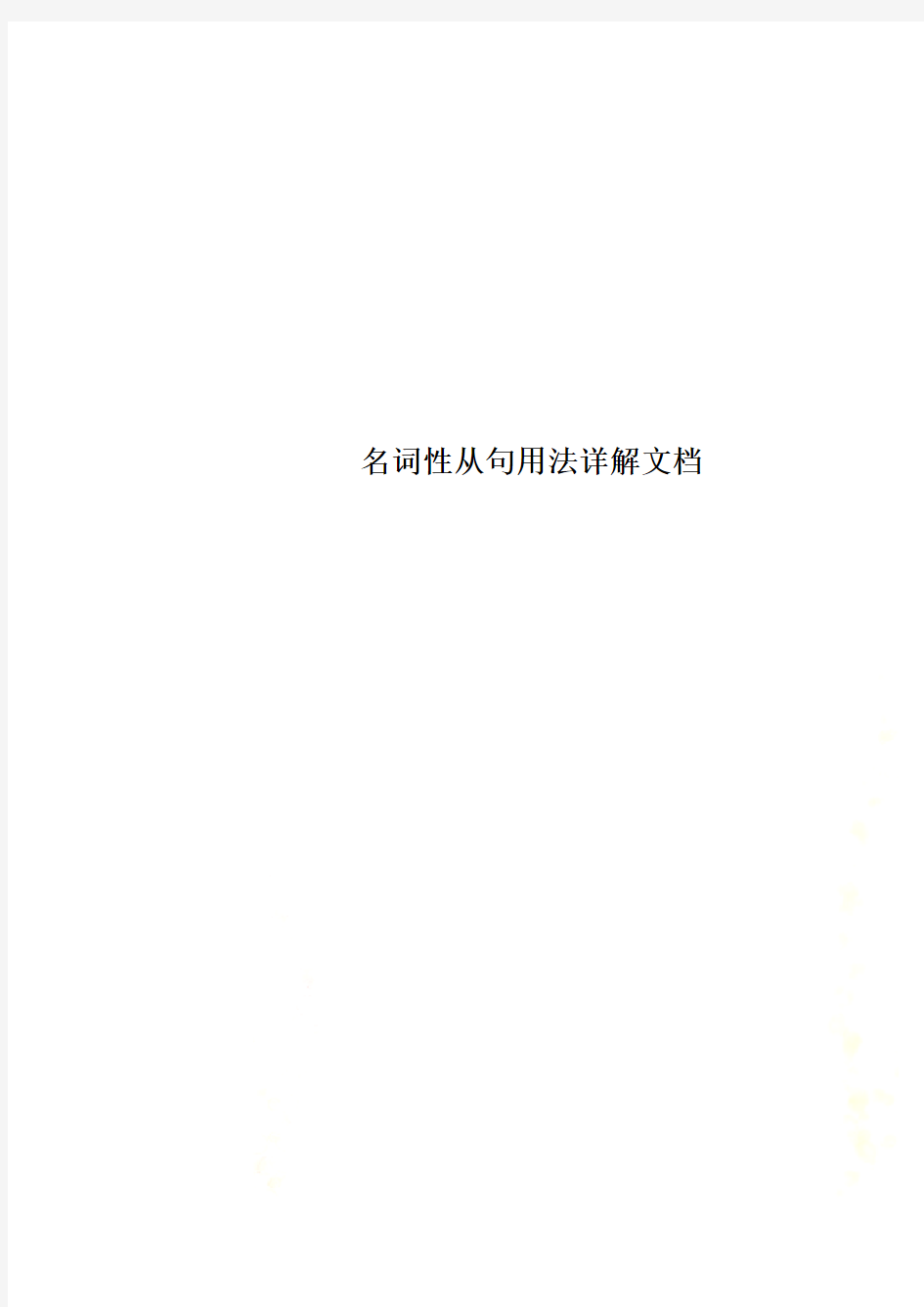
名词性从句用法详解文档
- 格式:doc
- 大小:62.00 KB
- 文档页数:27


名词性从句用法详解文档
高一语法专题:名词性从句
在句子中起名词作用的从句叫名词性从句。名词性从句的功能相当于名词词组,它在
复合句中能担任主语、宾语、表语、同位语,因此根据它在句中不同的语法功能,名词性
从句又可分为主语从句、宾语从句、表语从句、同位语从句。
引导名词性从句的词叫做连接词,包括:1. 连词(在名词性从句中只起连接作用,不
作成分)
2. 连接代词(在名词性从句中作主语、宾语
或表语)
3. 连接副词(在名词性从句中作状语)
所有的名词性从句的语序都是陈述句语序。
I 主语从句:是在主句中作主语的从句。它由连接
词引导,通常位于谓语动词之前。
连接词:
1. 连词:在从句中不充当任何成分,常见的引导主语从句的连词有that, whether。
That he got the first prize excited him much.
他获得一等奖一事使他非常兴奋。
It is doubtful whether we can get there on time.
我们能否按时到达那儿还不确定。
1)that引导的主语从句:在从句中不作任何成分,也没有实际意义。一般情况
下that不可省略。
That light travels in straight lines is known to all.
众所周知,光沿直线传播。
That you don't like him is none of my business.
你不喜欢他不关我的事。
2)whether引导的主语从句:常置于句首,表示“是否”之意;
if一般不引导主语从句。
Whether he can finish his task on time is of great
importance.
他是否能按时完成任务非常重要。
Whether you can succeed or not depends on how
hard you work at it.
你能否成功取决于你努力的程度。
2.连接代词:在从句中起名词或代词的作用,常作从句的主语、宾语、表语或定语,有具
体意义且不能省略。常见的连接代词有who, whom, whose, what, which,
whoever, whomever, whatever, whichever。
What we should do with the problem is undecided.
我们如何处理这个问题还未作出决定。(what引导主语从句,不表疑问意义)
Whom the letter was from is still unknown.
这封信是谁邮寄的还不清楚。
3.连接副词:在从句中起副词的作用,常作从句的状语,表示时间、地点、原因、方式等。
常见的连接副词有when, where, how, why, whenever, wherever, however等。
Why he did that wasn't quite clear.
他为什么做那件事还不十分清楚。
Where we can look up his address is still a problem.
我们在哪儿可以查他的地址还是个难题。
注意:it代替主语从句作形式主语
that从句作主语通常用it作形式主语,而将that从句置于句末。
常见的it替代主语从句的句式主要有以下几种:
1)It + 系动词+ 形容词+ that从句
It is quite clear that the whole project is doomed to failure.
很清楚,整个计划注定要失败。
It is likely that there will be a snowstorm tomorrow.
明天很可能会有一场暴风雪。
2)It + 系动词+ 名词+ that从句
常见的用于此结构的名词有:a pity (遗憾),a shame(遗憾,耻辱), a fact
(事实),an honor(荣耀),a wonder (奇迹),no wonder(难怪),good news
(好消息)等。
It's no wonder that you've achieved so much success.
难怪你已取得了如此大的成功。
It's a pity that you didn't attend their wedding.
你没有参加他们的婚礼真是遗憾。
3)It + 系动词+ 动词的过去分词+ that从句
It is said that no passengers were
injured in the accident.
据说在那次意外事故中没有乘客受伤。
It is announced that the plan has been successfully carried out.
据宣布计划已被顺利实施。
4)It + 特殊动词+ that从句
常用于这种结构的动词有:seem(看上去),appear(显得),happen(碰巧),
matter(关系重大),turn out(结果),occur to sb. (某人突然想起)等。
It seems to me that he objects to the plan.
在我看来,他好像反对这个计划。
It happened that I met an old friend on the street yesterday.
昨天我碰巧在街上遇见了一位老朋友。
II 宾语从句:在主句中起宾语作用的从句称为宾语从句。宾语从句可分为动词的宾语从句、
介词的宾语从句和形容词的宾语从句。